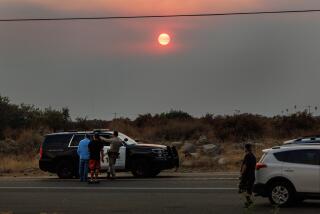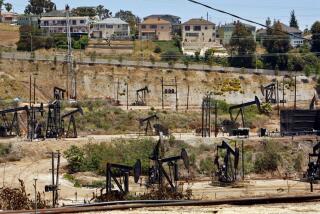Study: âFrackingâ may increase air pollution health risks
Air pollution caused by hydraulic fracturing, a controversial oil and gas drilling method, may contribute to âacute and chronic health problems for those living near natural gas drilling sites,â according to a new study from the Colorado School of Public Health.
The study, based on three years of monitoring at Colorado sites, found a number of âpotentially toxic petroleum hydrocarbons in the air near the wells including benzene, ethylbenzene, toluene and xylene.â The Environmental Protection Agency has identified benzene as a known carcinogen.
Soon to be published in an upcoming edition of Science of the Total Environment, the report said that those living within a half-mile of a natural gas drilling site faced greater health risks than those who live farther away. Colorado allows companies to drill for natural gas within 150 feet of homes.
Hydraulic fracturing, or fracking, involves injecting great volumes of water and sand laced with chemicals into shale formations to break apart the rock and unlock reservoirs of oil and gas. Its advocates say it carries minimal environmental risks and the chance of great economic rewards for companies and communities. Its critics have largely focused so far on frackingâs possible contamination of underground and surface water.
But when a well is fracked, itâs almost as if a small factory is rapidly erected at the drilling site, as machinery and tanks of chemicals and water are brought in. Studies have shown that air pollution at many of these sites is greater than in surrounding areas. Adhering to EPA standards, the researchers for this study used air toxics data collected in Garfield County from January 2008 to November 2010. A small rural community in Colorado, Garfield is poised to undergo a sharp increase in drilling activity.
The study pointed out that earlier research indicated that prolonged exposure to petroleum hydrocarbons in the air near refineries, oil spills and petrol stations pointed to âan increased risk of eye irritation and headaches, asthma symptoms, acute childhood leukemia, acute myelogenous leukemia, and multiple myeloma.â
âOur data show that it is important to include air pollution in the national dialogue on natural gas development that has focused largely on water exposures to hydraulic fracturing,â said Lisa McKenzie, PhD, MPH, lead author of the study and research associate at the Colorado School of Public Health.
The EPA is finalizing new rules to curtail air pollution at oil and gas drilling sites. A recent Bloomberg News poll suggested a majority of Americans would like to see tighter regulation of fracking.
[For the record: 8:15 a.m. March 21: An earlier photo and caption on this post stated that Ohio officials found that fracking was almost certainly responsible for earthquakes in that area. They actually found that injection wells were the likely cause, which is a different process.]
RELATED:
Enviros petition to protect wolf as endangered in California
Poll: More Americans now back domestic drilling
More Americans now believe in global warming







